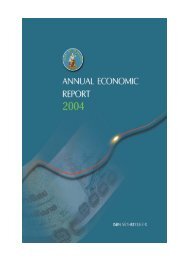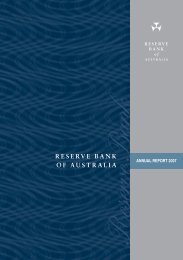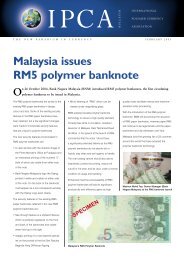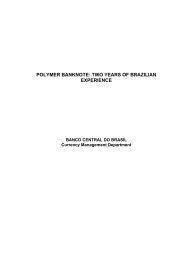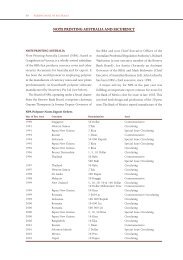ANNUAL REPORT 2008 - Polymer Bank Notes of the World
ANNUAL REPORT 2008 - Polymer Bank Notes of the World
ANNUAL REPORT 2008 - Polymer Bank Notes of the World
You also want an ePaper? Increase the reach of your titles
YUMPU automatically turns print PDFs into web optimized ePapers that Google loves.
Cypriot Law imposes restrictions with respectto certain economic activities and benefits,non-compliance with which provides a groundfor dismissal <strong>of</strong> <strong>the</strong> Governor <strong>of</strong> <strong>the</strong> Central<strong>Bank</strong> <strong>of</strong> Cyprus. Had <strong>the</strong> ECB been consulted, itwould have made significant critical commentsas to <strong>the</strong> compliance <strong>of</strong> <strong>the</strong>se provisions withArticle 14.2 <strong>of</strong> <strong>the</strong> Statute <strong>of</strong> <strong>the</strong> ESCB.The ECB was not consulted by <strong>the</strong> Frenchauthorities on two amendments to <strong>the</strong> draftlaw on <strong>the</strong> modernisation <strong>of</strong> <strong>the</strong> economywhich fur<strong>the</strong>r simplified <strong>the</strong> statute <strong>of</strong> <strong>the</strong>Banque de France by, inter alia, abolishing <strong>the</strong>monetary committee <strong>of</strong> its General Council andtransferring to <strong>the</strong> Governor responsibility fortransposing ECB guidelines. Although <strong>the</strong> ECBwould not have objected to <strong>the</strong>se institutionalchanges, it should have been consulted since <strong>the</strong>provisions relate to <strong>the</strong> Banque de France.The Dutch authorities failed to consult <strong>the</strong>ECB on <strong>the</strong> Law amending <strong>the</strong> law on financialsupervision. The Law states that in exceptionalcircumstances, De Nederlandsche <strong>Bank</strong>and <strong>the</strong> Autoriteit Financiële Markten mayadopt temporary rules to foster <strong>the</strong> stability<strong>of</strong> <strong>the</strong> financial sector. In a letter to <strong>the</strong> DutchMinister <strong>of</strong> Finance, <strong>the</strong> ECB noted that <strong>the</strong>draft legislation related to an NCB and rulesapplicable to financial institutions that materiallyinfluence <strong>the</strong> stability <strong>of</strong> financial institutionsand markets, and that <strong>the</strong> ECB should <strong>the</strong>reforehave been consulted.The ECB was not consulted by <strong>the</strong> Portugueseauthorities on three legal acts adopted in <strong>the</strong>context <strong>of</strong> <strong>the</strong> financial turmoil. One assigned to<strong>the</strong> Banco de Portugal tasks such as assessingcredit institutions’ requests for an increase <strong>of</strong>own funds and overseeing compliance withrecapitalisation plans. The o<strong>the</strong>r two legal actsprovided for <strong>the</strong> Portuguese state to stand asguarantor to <strong>the</strong> financing <strong>of</strong> credit institutionsregistered in Portugal, with <strong>the</strong> Banco dePortugal being one <strong>of</strong> <strong>the</strong> authorities responsiblefor reviewing financing requests and monitoring<strong>the</strong> enforcement <strong>of</strong> such state guarantees.Since <strong>the</strong> adopted legislation relates to an NCBand lays down rules applicable to financialinstitutions that materially influence <strong>the</strong> stability<strong>of</strong> financial institutions and markets, <strong>the</strong> ECBshould have been consulted.The ECB was not consulted by <strong>the</strong> Romanianauthorities on draft legislative provisionstransposing Directive 2006/43/EC on statutoryaudits <strong>of</strong> annual accounts and consolidatedaccounts into Romanian law. Although thisconcerned <strong>the</strong> transposition <strong>of</strong> an EC Directive,<strong>the</strong> ECB should have been consulted since<strong>the</strong> provisions concerned Banca Naţională aRomâniei.6.3 ADMINISTRATION OF THE BORROWING ANDLENDING OPERATIONS OF THE EUROPEANCOMMUNITYIn accordance with Article 123(2) <strong>of</strong> <strong>the</strong> Treatyand Article 9 <strong>of</strong> Council Regulation (EC) No332/2002 <strong>of</strong> 18 February 2002, <strong>the</strong> ECB continuesto have responsibility for <strong>the</strong> administration <strong>of</strong><strong>the</strong> borrowing and lending operations <strong>of</strong> <strong>the</strong>European Community under <strong>the</strong> medium-termfinancial assistance mechanism. In <strong>2008</strong> <strong>the</strong>ECB received a principal sum from creditorsvis-à-vis <strong>the</strong> Community and paid <strong>the</strong> loanamount to <strong>the</strong> borrower country (Hungary). Thetotal amount <strong>of</strong> outstanding Community lendingoperations with Hungary as at 31 December<strong>2008</strong> was €2 billion (by comparison, <strong>the</strong>re wereno outstanding balances at <strong>the</strong> end <strong>of</strong> 2007).6.4 EUROSYSTEM RESERVE MANAGEMENTSERVICESIn <strong>2008</strong> a comprehensive set <strong>of</strong> servicescontinued to be <strong>of</strong>fered under <strong>the</strong> frameworkestablished in 2005 for <strong>the</strong> management <strong>of</strong>Eurosystem customers’ euro-denominatedreserve assets. The complete set <strong>of</strong> services –which is available to central banks, monetaryauthorities and government agencies locatedoutside <strong>the</strong> euro area, as well as to internationalorganisations – is <strong>of</strong>fered under harmonisedterms and conditions in line with general market134 ECBAnnual Report<strong>2008</strong>


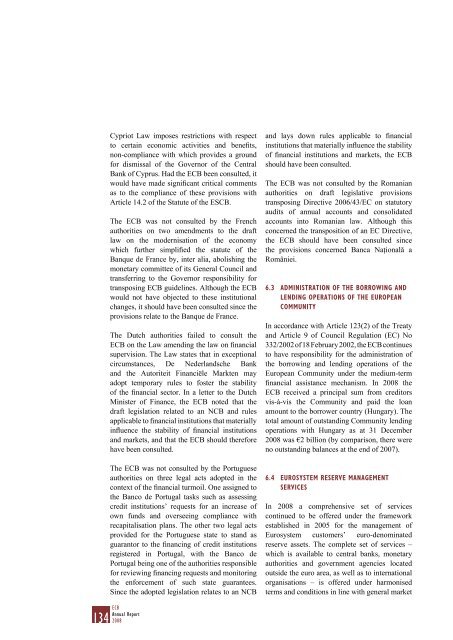

![KNOW YOUR NEW GIBRALTAR BANKNOTES - [Home] bThe/b](https://img.yumpu.com/50890985/1/184x260/know-your-new-gibraltar-banknotes-home-bthe-b.jpg?quality=85)
![PAPUA NEW GUINEA - [Home] - Polymer Bank Notes of the World](https://img.yumpu.com/49758743/1/190x143/papua-new-guinea-home-polymer-bank-notes-of-the-world.jpg?quality=85)



